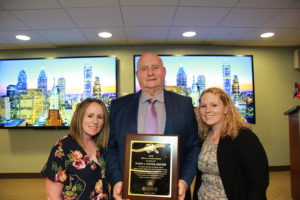
Harry J. Cooper's Biography:
Harry J. Cooper is a lawyer and educator who has worn many hats during a professional career that has seen him go from the classroom to the patrol car, and on to the courtroom and back to the classroom. After serving as a counselor for troubled youth and an eighth grade teacher, Cooper served almost two decades in law enforcement. He rose from patrol officer to Chief of the New Britain Township Police Department, working full time even while going as an evening student to Temple Law School. While at Temple, Cooper became the first recipient of the Beth Early Farnbach Award for outstanding service in providing legal education to the K-12 students of the Philadelphia area through the Law, Education and Participation program of the Temple University School of Law (Temple-LEAP).
Cooper’s legal work involves criminal defense, including juveniles, family law, and civil legal work. Cooper is an honored pro bono volunteer, winning the Pennsylvania Bar Association Pro Bono Award in 2012. He works with poor people at no cost in a variety of settings and he supports the Wills for Heroes Program of the PBA’s Young Lawyer Division which has provided at no cost first responders and veterans with wills and other estate planning documents. Cooper was honored in 2018 with the PBA’s Ernico Award for a lifetime of service to those in need.
Cooper has long been a champion of non-violence, having been one of the original trainers for Project PEACE (Peaceful Endings through Authorities, Children and Educators), a peer mediation, anti-bullying and youth court program jointly sponsored by the PBA and the Pennsylvania Office of the Attorney General. He is a veteran mock trial coach and judge, working with individual teams and to support the statewide competition for nearly a quarter century. Cooper has been an Adjunct Professor at Rowan University in Glassboro, New Jersey, Gwynedd Mercy College, Gwynedd Valley, PA, Harcum College in Bryn Mawr, PA, and Gratz College, Elkins Park, PA through Bob Randall Associates. He has taught hundreds of teachers over the years in courses ranging from school law to crisis, from bullying prevention to poverty. His favorite graduate course that he teaches just might be a sports law class which has a concussion mock trial as its culminating activity.
Cooper’s commitment to public service and to educating the next generation of citizens is deep rooted as public service is a family commitment. Cooper is named after his grandfather, a Philadelphia Police Officer who was killed in the line of duty thwarting a bank robbery.
Cooper is a widower with two grown daughters, a granddaughter, and a grandson. He is pictured with his daughters.
Future of Social Studies:
As a former Chief of Police and school teacher who now works as both a criminal justice attorney and as an instructor in law-related and civic education, I see the future of social studies in Pennsylvania in terms of promoting hands-on education so the next generation of young people will be prepared to take on the role of active citizen in our society. Mock trials, search simulations, moot court, mediation, anti-bullying education, youth courts…I have used all of these interactive and stimulating methods of making the law come alive for young people and I have seen students who didn’t have a spark in the classroom come alive with interest.
PCSS, as the umbrella organization for social studies education in the Commonwealth, must support social studies educators young and old. I have been part of a strong Philadelphia area law-related education partnership with Past PCSS President David Trevaskis and I have been involved in PCSS activities, such as the annual conference, and Board, for many years. If re-elected to the Board, I look forward to building on my civic education work and helping PCSS grow.
